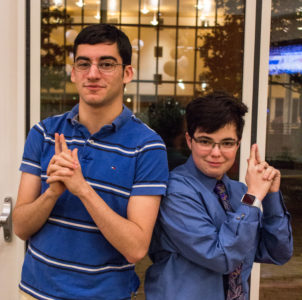
The Grinnell Goon Club, which meets every Saturday at 1 p.m. in Younker lounge, is a study break group centered on the party game Mafia. Mafia is based on lies, manipulation, people reading and statistics.
“[Mafia] can be very simple or very complicated,” said Andrew Lieman ’19, co-founder of the club.
In the simplest form, the game master secretly selects participants as mafia or townspeople. The mafia’s goal is to eliminate the townspeople, while the townspeople’s goal is to try to stop them.
“There is a town faction, which is an uninformed majority, and a mafia faction, which is an informed minority. Each of them wants to eliminate the other. There’s day phases where everyone … votes on who they think is mafia. [The mafia] would vote to sort of trick the town into getting another town member and then that person is eliminated from the game. … It goes to a night phase where the mafia picks someone that they want to take out. It goes on like that that until either all the mafia or all the townspeople are eliminated,” Lieman explained.
With larger groups of people, other roles such as doctor, cop, vigilante and serial killer are available to spice up the game.
“The doctor can save [a] person … a sheriff or cop can investigate someone each night to find out if they are mafia,” Lieman said.
Sometimes players add modifiers such as “vengeful” to their roles to give even more variety.
“I’ve seen wikis filled with different types of roles,” said Lauren Schweitzer ’20, co-founder of the club. About 20 people are required to have these more complicated games.
“We had more people than I thought were going to come — we had six or seven,” Schweitzer said about the first club meeting.
The two are optimistic about future attendance. They started the club to provide a fun study break for as many students as possible.
“I actually wanted to start this club last year, but I was thinking … ‘I don’t know if I have the time’ and then I met my friend here. … If there’s two of us, we can sort of split the workload of running a club,” Lieman said.
In addition to hosting physical games, the two hope to create online versions, hopefully one that will last for the entirety of winter break.
“We’re also considering starting up some online games that people can play throughout the week with 48-hour long day phases,” Lieman said.
Ultimately, participation is the deciding factor in the complexity of games, so they encourage everyone who is interested to come.
“Everyone is welcome, no experience necessary,” Schweitzer said.

















































